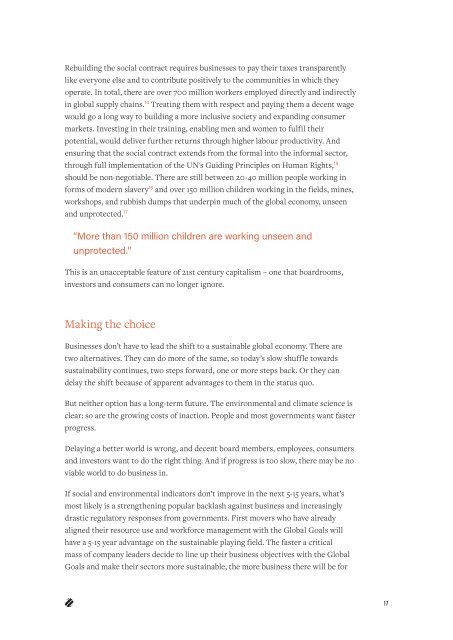BETTER BUSINESS BETTER WORLD
2jxE7K2
2jxE7K2
You also want an ePaper? Increase the reach of your titles
YUMPU automatically turns print PDFs into web optimized ePapers that Google loves.
Rebuilding the social contract requires businesses to pay their taxes transparently<br />
like everyone else and to contribute positively to the communities in which they<br />
operate. In total, there are over 700 million workers employed directly and indirectly<br />
in global supply chains. 14 Treating them with respect and paying them a decent wage<br />
would go a long way to building a more inclusive society and expanding consumer<br />
markets. Investing in their training, enabling men and women to fulfil their<br />
potential, would deliver further returns through higher labour productivity. And<br />
ensuring that the social contract extends from the formal into the informal sector,<br />
through full implementation of the UN's Guiding Principles on Human Rights, 15<br />
should be non-negotiable. There are still between 20-40 million people working in<br />
forms of modern slavery 16 and over 150 million children working in the fields, mines,<br />
workshops, and rubbish dumps that underpin much of the global economy, unseen<br />
and unprotected. 17<br />
“More than 150 million children are working unseen and<br />
unprotected.”<br />
This is an unacceptable feature of 21st century capitalism – one that boardrooms,<br />
investors and consumers can no longer ignore.<br />
Making the choice<br />
Businesses don’t have to lead the shift to a sustainable global economy. There are<br />
two alternatives. They can do more of the same, so today’s slow shuffle towards<br />
sustainability continues, two steps forward, one or more steps back. Or they can<br />
delay the shift because of apparent advantages to them in the status quo.<br />
But neither option has a long-term future. The environmental and climate science is<br />
clear: so are the growing costs of inaction. People and most governments want faster<br />
progress.<br />
Delaying a better world is wrong, and decent board members, employees, consumers<br />
and investors want to do the right thing. And if progress is too slow, there may be no<br />
viable world to do business in.<br />
If social and environmental indicators don’t improve in the next 5-15 years, what’s<br />
most likely is a strengthening popular backlash against business and increasingly<br />
drastic regulatory responses from governments. First movers who have already<br />
aligned their resource use and workforce management with the Global Goals will<br />
have a 5-15 year advantage on the sustainable playing field. The faster a critical<br />
mass of company leaders decide to line up their business objectives with the Global<br />
Goals and make their sectors more sustainable, the more business there will be for<br />
17


